#Disability Tropes
Explore tagged Tumblr posts
Text
Disability Tropes: The Perfect Prosthetic

[ID: A screenshot from the movie Nimona, showing Nimona, a small white girl with red hair, grabbing the right prosthetic arm of Ballister, a knight in black armour with black hair and light brown skin. He is holding a broken bottle in his prosthetic hand while Nimona admires his arm. Overlaid on the screenshot is white text that reads "Disability Tropes: The Perfect Prosthetic" /End ID]
In a lot of media, prosthetic limbs are portrayed as these devices that act as a near-perfect replacement for a character who has lost, or was born without a limb. So much so that in a lot of cases, the use of a prosthetic has basically no impact on the character beyond a superficial level or their appearance, or it's portrayed as something that's even better than the old meat-limb it's replacing. This trope shows up most often in Sci-fi, but it shows up in all kinds of stories outside of that, even otherwise very grounded ones!
If a story isn't depicting the loss of a limb as the be-all-end-all worst thing that can happen to a person, they almost always default to a perfect prosthetic, functionally curing the amputation with it. But the reality is that prosthetics are FAR from perfect, and as someone who has used them for their entire life I don't think they ever will be. Limb difference is still and always will be a disability, regardless of the prosthetics available, and this really isn't a bad thing.
Why is this trope so common?
I meant it when I said this is a really, really a common trope, so much so that the majority of the media I've seen with amputees and characters with limb differences that released in the last decade or end up using it. Even stories where becoming an amputee is treated like a fate worse than death, ironically, aren't excluded from this. I have a few theories as to why this has happened: The pessimistic answer is that it's easy. You get to have a disabled character and claim you have disability representation, without really having to do much extra work or research because most of your audience won't notice if you aren't accurate - in fact they kind of expect it. You also, for the most part, dodge the backlash other kinds of disability representation (or really any minority representation) usually get. The more optimistic reason is that, for a long time, amputees and people with limb differences (as well as a lot of other disabled people) were predominantly shown in media as sad, depressed and unable to do anything, very much falling into the "sad disabled person" trope. As a kid, this was really the only way I saw people like me on screen or in books. And so, the limb difference community pushed back against that portrayal and were pretty successful in changing the narrative in the public's eye. A little too successful. A lot of creatives were genuinely trying to do right by our community, listen and do better, but many simply overcorrected and instead ended up creating stories where prosthetics were essentially cures instead of the mobility aids they are. I also think the public's general lack of understanding about disability plays a roll in all this. There are a lot of people who, in my experience, believe that the more visible a disability is, the worse it is. Limb differences and amputations are very visible, but prosthetics, even those that aren't trying to be discreet, make them less so. While using a prosthetic is very, very different to a biological limb, you won't necessarily see how in a casual interaction with, say a co-worker or neighbor, especially because there is a very real stigma applied to people with limb differences to keep those things hidden from the public. There are other reasons too, such as the fact that a lot of creatives don't even consider the connection to real amputees when creating characters with robotic limbs in genres like sci-fi and some fantasy, so they never stop to consider that these tropes could be impacting real people. Amputees are also very frequently used in "inspiration porn" content that uses the angle that disabilities can be "overcome" with a good attitude, downplaying the way those disabilities actually impact us. The prosthetics industry - specifically the component manufacturers, often also push the idea of prosthetics being the only way to return to a "normal" life, both to the wider public and to people with limb differences and amputations (which can add to that sense of shame I mentioned when it doesn't play out that way for them). On top of that, I also think the recent increase in popularity of concepts like trans-humanism contributes to it as well. these movements often talk about robotic or bionic body parts being enhancements and "the way of the future", and I think people get a bit too caught up on what may be potentially possible in the future with the real, current experiences of people with "robotic limbs" aka prosthetics, now. There are also inherently disabling things that come with removing and replacing parts of your body, things that will not just go away with some fancier tech.
So How do you actually avoid the trope?
So, we have some ideas about why it happens, but how do you actually avoid the "perfect prosthetic" trope from appearing in your work? The most important thing is to remember that this is still a disability. The loss of a limb, even with the best prosthetic technology or magical item in the world, will always have some inherently disabling aspects to it - and this is not a bad thing. The key is to not over-do it, lest you risk falling into the old "sad disabled person" trope. So let's go over some of the ways you can show how your character's disability impacts them. You don't have to use all of these recommendations, just choose the ones that would best fit your character, their circumstances and your setting.
The prosthetic itself is just different
Probably the most important thing to address and acknowledge for prosthetic-using characters, is the actual ways in which the prosthetic itself is different from a biological limb, and the drawbacks and changes that come with that. For the sake of simplicity, I'm mainly going to focus on modern prosthetics here, but it's worth considering how to apply this your own, more advanced/fantastical prosthetics too. One major thing that most people writing amputees fail to acknowledge is that prosthetic limbs are not fleshy-limbs with a different coat of paint. They do the same basic thing their meat-counterparts do, but how they do it is often drastically different, which changes how they are used. A really good example of this is in prosthetic feet. There are dozens of joints in a biological foot, but most prosthetic feet have no joints or moving parts at all. Instead of having dozens of artificial joints to mimic the real bone structure of a foot, which are more prone to failure, require power and make the prosthetic much, much heavier for very little gain, prosthetic feet are often constructed from flexible carbon fiber sheets inside a flexible rubber foot-shaped shell. This allows the bend and flex those bones provide, without all the drawbacks that come from trying to directly mimic it. Making the sheets into different shapes makes them more ideal for different activities. E.g. feet made for general use, like walking around the city, are simple and light, shaped to encourage the most energy-efficient steps, while still allowing their users to do things like wear normal shoes. Feet made for rough terrain often have a split down the middle of the foot to allow the carbon fiber sheets to bend better over rocks when there is no ankle, and some newer designs also include a kind of suspension using pressurized air pulled from the prosthetic socket to allow some additional padding. Running feet have large "blades" made of these carbon fiber sheets to absorb more pressure when the foot hits the ground, and redirect the force that creates to propel their user forward as quickly as possible.

[ID: A photo of 4 prosthetic feet. On the left, the foot is covered with a black shoe, the one to it's right consists of a small, carbon fiber blade, split down the middle, in roughly the same shape and size as the previous foot. Next to the right is an even simpler and smaller carbon fiber foot with no split, and finally is a very short foot that is vaguely rectangular in shape. /End ID]
These are some of my own prosthetic feet I've had over the years. The two on the right are designed to be used by someone who is less mobile, and the ones on the left are made for someone who is more active. As my needs changed over the years, I've used different designs and styles, and keep the old ones since my needs do tend to fluctuate.
There are also robotic feet available that are designed as a kind of "all-purpose" foot that use an electronic ankle which more closely mimics a biological foot, but they are not very popular as the mechanism adds a lot of extra weight and it requires a battery and power to work, with many amputees feeling the jointless carbon fiber feet do a better job at meeting their needs. The same goes for arms and hands. "Robotic" hands that mimic a meat hand exist, but they aren't really that popular, even in places like Australia where the prohibitively expensive price tag isn't as much of an issue due to government programs that pay for the device for you. Instead, most arm amputees who use prosthetics that I know prefer simpler devices that do specific tasks, and just swap between them as needed, rather than something that tries to do it all. A big part of this is because the all-purpose hands can be clunky. they often require manual adjustment using the other hand to do simple things like going from holding a deck of cards to putting them down and picking up a glass of water, for example. The few that don't require that, I've been told, are often temperamental and don't actually work for every person with a limb difference.
Altered Proprioception
Loosing a limb is a big deal and this is always going to have an impact on the body in some way that won't be solved with a fancy piece of tech. One such example is how limb loss effects your sense of proprioception. This is your sense of where your body parts are in space. It's how you (mostly) know where your foot is going to land when you're walking, or how you're able to do things like lift up a glass of water without needing to actually watch your hand do it. Your brain does this by creating a mental map of your body, but this map doesn't get adjusted if you loose a limb. If that map doesn't accurately reflect your real body, you're not going to have an accurate sense of proprioception. This might look like a leg amputee being a bit less stable on their feet, or like an arm amputee needing to look at their arm or hand to be able to grab something with it. Those born without their limbs who take to using prosthetics often have a lot of trouble adapting, as their brains aren't used to having that limb in the first place, whereas an amputee's brain can sometimes be tricked into using their outdated body map to help them adjust to the prosthetic (though its impossible to line it up perfectly). Prosthetics that directly integrate with the nervous system, while rare, do exist, and even this direct connection doesn't completely erase this issue for reasons doctors aren't quite sure about. This is something that does become less of a problem with time. Eventually, someone proficient with their prosthetic will learn to compensate, but their sense of proprioception will never be 100% perfect. At the end of the day, no matter how it attaches, a prosthetic is still not a natural part of the body, and that will always cause some issues. It also means if they aren't practicing it all the time, they may have to relearn how to compensate for it.
Extra weight
You also have to remember that a prosthetic is not a natural part of the body, like we already talked about, and so no matter how good it is, your brain will most likely always interpret the weight of the prosthetic as something attached to you, not part of you. This means that, even though prosthetics are actually a lot lighter than biological limbs, they feel so much heavier. This is because, while a meat limb is heavier, a lot of that weight is from muscles which are actively contributing to the limb working, so it doesn't really feel like its that heavy. When you have less of your meat-limb though, you have even less muscle to work with to move this big thing strapped to it, so it feels heavier. The more of the limb you've lost, or just didn't have, the heavier the prosthetic has to be, and the less muscle you have left to move it. It's for this reason that a lot of amputees and people with limb differences get tired faster when using prosthetics. Some of us are fit enough where you almost wouldn't notice the extra effort they need to put in, but once again, just because you can't see it from the outside, doesn't mean it's not an issue.
Avoiding Water
Most prosthetics also aren't waterproof, and so prosthetic users have to be very careful about when and how they come into contact with it. For amputees with electric components, contact with water at all will likely damage the device. This can even include especially heavy rain, something I was told to avoid when I got my electronic knee prosthetic and something I assume would also apply to arm amputees with complex, electronic hands. For those with non-electronic prosthetics, water can be hazardous for different reasons. If the prosthetic has metal components, water may cause them to rust, especially if it's salty water. Other prosthetics have foam covers to give the illusion of a limb with the general shape of muscles and fat, but these covers do not come off, and if they get wet enough that water seeps all the way through, it is very hard to dry it and they may become moldy. Finally, cheaper modern prosthetics may also float. Many are made of very light-weight materials and some have pockets of air trapped inside them. For leg prosthetics in particular, this means a user might, at best, struggle to swim with them on, but at worst, may get flipped upside down and become trapped underwater - something that happened to me as a very young child. On the flip-side, older prosthetics were usually made of heavy materials like wood or steel, and so had the opposite problem, acting like a weight and pulling a person down if they were to wear them in the water. Water-safe prosthetics do exist, I had a pair of prosthetic legs as a teenager that were hollow, and designed especially for me to swim with fins on when swimming in the ocean, and Nadya Vessey, a double leg amputee in New Zealand even got a mermaid-tail prosthetic made especially for use in the water. Most amputees though just swim without any prosthetics at all, and in 99% of cases, this is the easiest and safest way to go.
Prosthetic-Related Pressure Sores and Pain
Many people with limb differences also experience pressure sores from their prosthetics. Modern prosthetics typically attach to the body using a socket made of carbon fiber or fiberglass, held on either by pressure, using a vacuum seal or through a mechanical locking system built into the socket. No matter the specifics though, the socket has to be very tight in order to stay on, and this means that extended periods of use can lead to rub-spots, blisters and pressure sores. Many socket prosthetics also use silicone liners to add extra padding, but this means wounds caused by the pressure can't breathe, and bacteria in sweat has nowhere to go, meaning if the person doesn't rest when one of these wounds occur, it can very easily and quickly turn into a serious infection. In a properly fitting prosthetic, used by someone who has fully adjusted to them, this doesn't happen often, but it is something most amputees and people with limb differences have to at least be mindful of. Some new prosthetics use a different method of attachment, called Osteointegration - where the prosthetic attaches to a clip, surgically implanted into the person's bones. While Osteointegration avoids many of the issues like pressure sores that come from a socket, they have their own issues: mainly that they are incredibly expensive, and as of right now, have a pretty high failure rate due to the implant getting infected. Because the implants are directly connected to the bone, these infections become very serious very quickly. Many people with Osteointegration limbs have to be on very strong medication to keep these infections at bay, and they are generally considered unsuitable for anyone who is going to regularly come into contact with "unclean" environments.
Maintenance

[ID: A screenshot of Winrey, from Full Metal alchemist Brotherhood, a white woman with blond hair handing out the sides of a green hat. She is measuring a piece of metal from a prosthetic she is making while Ed, the prosthetic's owner, gives her a thumbs up in the background. /End ID]
Finally, prosthetics also require maintenance from a specialist called a prosthetist, and they don't last forever. Some parts, like a foot or hand, can be reused over an over, but the sockets of a prosthetic need to be completely remade any time your body changes shape, including if you gain/loose weight, you start experiencing swelling, or you're just a child who is growing. Children in particular need new prosthetics every few months because they grow so fast, and as such, their prosthetics have to be made with this growth in mind. If they go too long without adjustment or an entirely new prosthetic, it can seriously impact the child and their growth but even small adjustments can be costly, depending on where you live. While prosthetics are built to be sturdy and reliable, they need a lot of work to stay that way. The more complex the prosthetic, the more work is needed. Complicated electronic components may need to have regular maintenance done by your prosthetist or even the specific component's manufacturer, and depending on where you live, this might mean having to send your prosthetic limb away for this to be done. While my prosthetist technically has the skills and knowledge to do the maintenance on my electronic knee, for example, the manufacturer forbids anyone not from their company to provide this service, meaning my leg needs to be shipped off to Germany once every few years if I want to keep the warranty. This has the unfortunate side effect of sometimes your limbs getting lost in postage (shout-out to Australia Post, who lost mine twice), meaning it can be months before you get it back or get a replacement. Usually, you'll be given a replacement in the meantime if you need it, but walking on a leg that isn't yours, even when its correctly fitted, always feels a bit weird (maybe that's just me though).
Not every difference is Inherently Negative
We've talked about some of the negatives that come from having a prosthetic, but not every difference is negative or even really that big of a deal. In fact, often times, it's these little moments in the depiction of a disability that go the furthest and make it feel the most genuine. My amputations effect me from the moment I wake up, to the moment I go to bed, but that doesn't mean every single way it impacts me is always inherently bad or negative. For example, back when I was working a normal job and going to university, I would often come home, throw my legs off at the door with the shoes still attached and get into my wheelchair, the same way you might throw your shoes off after work and replace them with comfy socks and other comfy clothing. This is something I've only ever seen on screen once, with Eda from the Owl House (and she wasn't even an amputee yet, her limbs were just detachable)

[ID: an screenshot of Eda from the owl house, a very pale woman, laying on the couch in a bathrobe, her hair in a towel. She has taken her actual legs off, throwing them to the other side of the seat. /End ID]
After that, my day mostly looked the same as most other people working a 9 to 5, I'd make myself dinner, watch some TV or play some games, maybe do some extra work at my desk or chat with friends. The only difference is that it would all be from a wheelchair, mainly because my prosthetics were heavy and it was just easier to use the chair around the house. The fact my afternoon and evening routine was done from a wheelchair wasn't a bad thing, it was just different. Likewise, I also don't sleep or shower with my prosthetics on, for the same reasons most other people wouldn't take a shower or sleep in thigh-high, steel-capped boots. In your own stories, this might look like giving your characters similar alterations to how they go about their day. Let them take their arm or leg off when they're resting or relaxing, show them taking a few minutes longer to get ready because they have to put it back on, show them doing some things without it. Arm amputees in particular tend to get very good at going about their days without their arm prosthetics, and leg amputees often either learn to get around more relaxed spaces like their homes using a different mobility aids like wheelchairs or crutches, or just through hopping if that's something they're physically able to do. Even when everything is going well and working as intended, your limb-different character won't wear their prosthetic 24/7, no matter how much they love it. There doesn't have to be something wrong with it or painful about it to not want it glued to them at all times, just like you can love a pair of big heavy boots but not want them on when you're trying to sleep. For more action-focused stories, being an amputee, also changes things like how you fight. The specifics will vary from person to person, but for example, when I did Hap Ki Do, a Korean Martial art, my instructor heavily modified when I learned what techniques. Beginner-level kicks and most leg attacks were impractical for me, as the force from the kicking motion would usually cause one of my legs to fly off. I also couldn't jump very well, due to some complications with my original amputation that made my stumps too sensitive to withstand the force of landing again. So I ended up learning a lot more upper-body attacks much earlier than it is typically taught. By the time I got my green belt, I was practicing upper-body techniques usually saved for black belts - including weapons training that I could use my secondary mobility aids for, like crutches and my cane in a bad situation. Many holds that rely on creating tension in your target are also less effective on amputees, because either the anatomy that causes those holds to be painful just simply isn't there, or the body part in question can just be removed to escape. Whether we're talking about the negative things, or just neutral differences that come with using prosthetics, you don't want to go too far with any one example. The key is to strike a balance. Of course, the old writing advice of "show don't tell" also applies here. It's one thing to tell us all of this stuff, but unless we actually see it play out, it won't mean much.
How NOT to avoid the trope
Before we move on, let's focus for a moment on some common things I've seen that you SHOULDN'T do as a way to get away from the trope.
The Enhanced Prosthetic
A lot of sci-fi in particular will take prosthetic limbs, make them function exactly the same as a biological limb, but add something extra to it. This does change the way the prosthetic functions and is used, but it usually still ignores the actual disabling parts of having a prosthetic. A really good example of this can be seen in pretty much any futuristic setting, but personally, I think Fizzeroli, from Helluva Boss is the best one to demonstrate what I mean. Fizz is a quadrilateral, above knee/above elbow amputee with highly advanced prosthetics that function, more or less exactly like the limbs he lost, but with the added benefit of being super-stretchy. Fizz is an acrobat and a clown in service, at least initially, to Mammon, one of the Seven Deadly Sins. These prosthetics help him perform and we even do see how they change little things like how he walks and just goes about his day, but the show still treats them like natural arms and legs, but better.

[ID: A screenshot of Fizzeroli from Helluva Boss, a white-skinned imp with 4 black, prosthetic limbs, dressed in teal a nightgown as he lays in bed, reading from a list /End ID]
We see that he never takes them off, even when sleeping, and when he needs to use them as regular arms and legs, they do everything he needs, perfectly fine - at least when they're working correctly. The only time he ever even takes them off or has any issues with them, is when they break in season 2. The word amputee is never used to describe him, as far as I remember, and the fact he is one never really comes up at all, except for when they break or when the story focuses on how he lost them. Which brings me to my next point.
The Glitchy/Broken Prosthetic
One way I see people try to avoid the perfect prosthetic trope, is to take the prosthetic and break it or otherwise make it unreliable by having it malfunction, but not really changing anything else. This approach is heading in the right direction but still kind of misses the point of the criticism a lot of limb different folks have with the depictions of prosthetics in the media. Yeah, prosthetics do break down and some do require extra maintenance, but if your character's prosthetic is still exactly the same as a biological limb (or even better, in the case of the "enhanced prosthetic") when it's not broken, and the only time their disability is treated like a disability, is when it breaks, you're not really addressing the issue. Real prosthetics, like we discussed, even when functioning at 100%, exactly as the manufacturer intended, don't function the same as a meat-limb. They are fundamentally different, and the glitchy/unreliable prosthetic completely ignores all of that. Once again, Fizz is a really good example of this - the only time his prosthetics are not perfect, is when they break or are malfunctioning (despite the criticism, I do genuinely love Fizz as a character, but he unfortunately does fall into a lot of disability tropes).

[ID: Another screenshot of Fizzeroli, this time in a torn up jester outfit, looking down, panicked, at his prosthetic arms which are fully extended and laying motionless on the ground, with his left arm visibly short-circuiting with electricity around it. /End ID]
Now this isn't to say you can't have your character's prosthetics break down or malfunction at all. just that this shouldn't be the only way you differentiate the prosthetic from a biological limb. You should also be mindful of how or why they're breaking. A typical prosthetic isn't going to break down randomly from normal use unless something is very, very wrong or your character just has a terrible prosthetist (which unfortunately, does happen). You might experience issues if you try to make the prosthetic do something it just wasn't designed to do, or expose it to something it wasn't designed to deal with though (e.g. submerging an electronic prosthetic in water and trying to use it to swim).
Just add Phantom Pain
Another common pitfall I see when people are trying to avoid the perfect prosthetic trope, is to just give the character in question phantom pain - which is a side-effect of amputation where your brain's mental map of the body doesn't acknowledged you lost a limb. Your brain tries to fill in the gaps, since there is no signals coming from that part of the body anymore, and assumes either something must be wrong and so you should be in pain, even when you actually aren't. Alternatively, it can also happen when your brain was so used to feeling pain from that area before, in the case of people who had chronic conditions before they lost their limb, that it just keeps remaking those old signals itself. Like the broken/glitchy prosthetic approach, this also doesn't really address the issue with the perfect prosthetic trope, because it has nothing to do with the prosthetic itself. Phantom pain doesn't come from the prosthetic, nor does it effect how they're used, and so including it doesn't really address the issue of the prosthetic being functionally the same as the original, biological limb. This isn't to say that you shouldn't include phantom limb sensation or pain as something your character experiences, but just keep in mind that, when used on it's own, it doesn't counter the trope. Also, just be sure to do your research, everyone's experience with phantom pain is different and it's not something everyone with a limb difference even experiences.
Why is this trope even a problem?
Alright, so we know what the trope is, we know why it became so prevalent, ways to avoid it and also how not to avoid it. All good information, but why is this trope even bad? Why should you try to avoid it? Outside of just wanting to portray a real disability that effects real people more accurately in your creations, the prevalence of this trope actually contributes to a lot of real-world issues, especially when it's as overused as it currently is. I've talked before about "the jaws effect" - where the depiction of something in the media, especially something that the public is widely uneducated on, influences how people see it in real life. The Jaws effect specifically referred to how the popularity of creature-feature movies featuring sharks, like Jaws, caused the belief that sharks were monstrous killing machines to become much more wide-spread, even going so far as to influence decisions about laws and policy surrounding real-life shark preservation and culling in some parts of the world. But sharks aren't the only thing this has happened to.
Disabled people are so thoroughly misunderstood by wider society, that when tropes like this one become popular, people can and often do start to believe the misinformation they spread - in this case, believing that our prosthetics are a perfect replacement for a biological limb, and that getting a prosthetic means you're not disabled any more. While this can be annoying and cause small scale issues for some of us, like people giving us a hard time for using disability accommodations we very much need, it can also impact us in systemic ways too. If the wrong people believe these tropes, it can and does have a very real impact on the lives of disabled people through things like changes to policies to make it harder for amputees and people with limb differences to access financial assistance for other things outside of our prosthetics we may need assistance with.
Conclusion
Despite the very real harm tropes like this can do when it's overused, I don't think it should go away entirely. Some of my favourite pieces of media even use the perfect prosthetic trope and there are even some kinds of media where I even think it's somewhat unavoidable. Characters with perfect prosthetics in kids media in particular, especially when talking about side characters, can help to correct some of the other stereotypes kids may have seen elsewhere - such as prosthetics being "creepy" or "scary" - in a way that is casual and easy for them to understand. The problem with the trope, in my eyes, is it's excessive overuse. It's the fact that it seems to be the only representation amputees and people with limb differences are getting now. Not every story with a limb-different character can or even should delve into the reality of what using prosthetics is actually like, but we need at least some stories that do, without it being this majorly depressing thing.
#Writing disability with Cy Cyborg#Disability tropes#Long Post#Disability Representation#Writing Disability#Writing#Writeblr#Authors#Creators#Writing Advice#Disabled Characters#On Writing#Disability in Media
3K notes
·
View notes
Text
The Problem With the Eddsworld Fandom's Depictions of Red Leader/Future Tord, A Disabled Perspective
Disability is a contentious concept for most of society, with most either treating us with disgust, confusion, refusing to treat us as human, or to see our struggles as what they are. Ableism affects all people in many different ways, but as someone who focuses a lot of my energy in fandom spaces, the pervasiveness of ableism with how media and their fans interpet and react to disabled characters is a very personal situation for me. While many may argue that an ignorance to these topics in fiction has little bearing on real life, the prevalance of these tropes have echoed and led to feelings of othering for many disabled people, and oftentimes support the same notions that lead to the day-to-day ableism in our own personal lives.
In recent years, I have experienced this most often with the prevalance of negative disability tropes perpetrated by fanfiction surrounding the character of Tord, also known under the alias of Red Leader in some fanworks. It is a problem not just common in the Eddsworld fandom. A more recent, and much larger fandom in Mouthwashing also shares a common trend of repeated ableism in fan depictions and interpretarions of disabled characters. Most fan creators are unaware of these tropes and the harm that they cause, but as a disabled person, I am unable to ignore it.
For context on myself, you can call me Fish. Get it? Or"fish"eus? I like to think I'm funny. I am a mentally ill, disabled, and neurodivergent creative who has niche interests in representation in media and the intersection of intersectionality and fandom spaces. I experience chronic pain due to a multitude of conditions, all of which are invisible disabilities. I am NOT an amputee or have a facial difference, like the character I am analyzing. I can only speak based on my own research in my attempts to portray him positively, but I want to mainly focus on the ableist tropes I see and the real life effects they have. That is something I CAN focus on, because I've been dealing with it for years from conditions that came onset later in my life. I will be speaking from that perspective, but will be doing my best to try to educate on what I do know from my research to help authors, artists, and creatives create a better portrayal of him in fanworks.
The most common tropes I see with him are what I will call "The Disabled Villain", "The Innacurate Disability", and "The Ignored Disability". There are a few tropes in each, but for ease of organization (and the sake of your (and my) time), I will be talking about them together in these sections. There are also overlaps in many, but I will define the main issues with them.
The Disabled Villain
James Bond, Wonder Woman, The Witches. You name it. You have most likely seen this trope at work in cinema. A malicious evil-doer is revealed to have a "horrid" face symbolic of the true evil within their soul, while the beautiful, able-bodied hero is meant to stop them. It's a trope as old as time, one that goes back to even Plato. Tropes are tropes, people subvert them, so a few cases down the line may be excusable. But that has not been the case For many years, the most prevalent form of representation for disabled people was in these villains. Imagine if the only representation you had for yourself was narratives surrounding how the way you look or what your disability is and have it only be equated to evil people. It leads to a villainization of disabled people. People react to facial differences with disgust, because they are "shown" that it is "evil", or "ugly", or equal to being a horrible person. As stated by The Nora Project, "According to the book Disabilities: Insights from Across Fields and Around the World, disabled students are two to three times more likely to be bullied in comparison to their nondisabled classmates. The disabled villain trope contributes to this phenomenon in overt and subtle ways. For example, the trope implicitly encourages fear of disability and difference, while validating, and even elevating, those who fight against the evil, Disabled Villain. Bullying based on fear and disdain is almost a natural consequence of the trope when viewed in this light". Another big issue is that disabled characters have not been given space to exist outside of villainy. There are not many complex narratives surrounding them. This leads to our disabilities being downplayed, us being dehumanised, and we are seen more like props in real life, or simply tools to achieve a message in a narrative.
Tord's disability is never explicitly shown in the show. It is something more prevalent in Fanon, specifically in fanworks that focus on the "Future" era of the show's timeline, where the narrative and outside discussions on the show implies a high tech society, potentially dystopian, potentially a consequence of his actions. These ideas have taken a life of their own in the fandom, with many creators fully expressing these ideas. The problem arises when Red Leader falls in line with this trope. In many works, he is the sole disabled character, a figure of pure evil, or given little nuance in the narrative. Artists illustrate his scars as bright red, crimson, or, in TBATF, green. For some reason. In this way, they attempt to highlight the villainy by equating him with common symbols of evil: facial differences and disabilities. Unfortunately, these are not just symbols. These are conditions and scars that real people have, which the fandom tends to ignore in favor of dramatization.
This was a trope I most commonly saw explored in fanfiction when I first joined in 2016/17. The show, unfortunately, subtly and accidentally perpetrated it by having the only character visibly and irreparably "damaged" by the giant robot fight be Tord, despite the fact that Tom, who had a whole missile directed at him and got buried under a house, was fine with at most a leg injury and a cut on his arm. Luckily, we have grown past the need for ableist tropes, and the faults of the show can be left in the past!
... Not.
Disability tropes have simply evolved in how the fandom treats Tord. Even if it is now done with more consciousness and sympathy towards his character, ignorance still prevails. Let's talk about common pitfalls people fall into when writing him.
The Inaccurate Disability
In fanon perception, Red Leader is an amputee with a high tech prosthesis and a facial difference resulting from burn scars. Like many disabled characters, he suffers from a collective fandom lack of research. But never fret! That is what I have subjected myself to for the past four years, so your friendly neighborhood disabled Fish can tell you how to right your fandom wrongs! Just kidding! Take this as a pointer, and do your own research.
As is common with fictional prosthetics, his arm prosthetic is treated as a perfect fix for his amputation. It acts just like, if not better than an actual arm. The issue with this is that is isn't realistic. Yes, I know, I'm criticising Eddsworld fanfiction for not being realistic. STAY WITH ME HERE. Once again, if it was one instance, or a few, that explored prosthetics being incredibly functional in science-fiction, then it could be a cool concept. But when every sci-fi work has it, then that is no longer a concept. That is a misconception. And I have interacted with people who believed that prosthetics were 100% functional! The thing is, like all disability aids, it does not suddenly make us able-bodied. For example, I have ear defenders that I wear when I experience pain within my ears. But that does not mean my hearing will now become normal, and I will no longer experience pain from the sound I'm hearing. What WILL happen is that I will straight up not hear you. Like, literally. Can you repeat that? I had my ear defenders on. Oh, you're saying that my ear defenders aren't prosthetics and are not a fair comparison? Well, that's fair, but take this as an illustration of a disability aid and how they differ from able-bodied experiences. Also, many prosthetic users do many things without their prostheses, and some even prefer NOT to wear them. Blogs that explicitly cover disabled representation, such as @/cripplecharacters, have posts that cover WHY many amputees are not fans of this trope. The problem comes with that it erases disability, and yet also treats us like we are given a space at the table of representation. It's just another way that authors avoid actually doing research.
Other things that people tend to ignore are how burn scars, or any scars, would not only appear on a character, but also affect them. I have seen, aside from skin tones that looked like they were picked out of a crayon box instead of what would appear on a person, teeth exposed, wounds that look as if they are fresh from the explosion YEARS after they occurred, and what I like to call "paper shredder" scars. Because instead of them looking like burn or shrapnel scars, it appears as if his skin was put through a shredder. Once again, another consequence of the show's at most-30 second scene with questionable decisions that made massive ripples in the fandom. With the injuries Tord received, it is most likely that he would have two kinds of injuries: a burn on 18% of his body (minimum, based on rule of 9s), and/or shrapnel scars from debris. While shrapnel scars would manifest as darker scars, the burn scar would likely be a hypertrophic scar, as "70% of patients develop hypertrophic scars following burns" (Finnerty et. al). The scars, when healed, are warm toned on the boundaries of their areas and cool in between. When on a pale skintone, they are not too dissimilar, and would therefore not have such a drastic color difference as seen on skin. They would also not go down to the bone or skin, as that would be a completely different kind of injury, and are also commonly done to make him look "scarier", which then aids the Disabled Villain trope. It also treats these scars and injuries more like a work of fiction, rather than something that many real people have experienced, adding to continuous misinterpretations of real life disabilities and facial differences.
For writers wanting to include consequences of burns, what would be more likely to be affected are his hearing, vision, and nerves on the right side of his face, as burn scars can go as deep as nerve endings. Also, burn scars, especially third degree burns, require treatments, such as burn-specific skincare. Scars, especially burn scars, can affect you and become disabling. For artists, the main thing I don't see artists do is draw him with damaged hair follicles. Burn scars damage the scalp and eyebrows, preventing hair growth. I am sorry, but he would not still have fluffy, luscious hair. Do not kill me. He just wouldn't. And if you are saying that he had it in the show, I can't hear you because my ear defenders are on, but I hope you heard me, as we've gone over that the show is inaccurate and we should do our own research.
Even well intentioned authors and artists ignore many aspects of the disabilities he would likely have!
Which brings us to the last trope...
The Ignored Disability
Many well meaning people intend to give him nuance by trying to avoid the Disabled Villain trope. Accidentally, however, they end up completely ignoring his disabilities instead.
Just like the high-tech prosthetic, the real disabling aspects of having a disability are at best rarely mentioned. I have seen, in some fanworks, that he goes straight from amputation to having a prosthetic. And that is where his disability ends. Because the prosthetic ends up being a fix-all situation. Authors refuse, or forget, to include aspects of amputation, such as the healing process, stump or phantom pain. Artists will cover up his scars with a helmet or a mask, another trope that undermines his disabilities and attempts to brush it under the rug. I understand that there is a discomfort for able-bodied authors in thoroughly exploring how a character feels about their disability. That is something I think we should. Avoid. If you're not familiar with the experience of being that minority, you do not need to add commentary on it. And if you do, and it just falls into more negative tropes, I will send a salmon cannon at you (/j). However, I do not agree with brushing every disabling aspect of his life under the rug.
People can assume it's not a problem, like it isn't something blatantly apparent. But, if you assume that disability and being disabled is not a "big thing", you end up where your medication is denied because your insurance refuses to see your common procedure as not a necessary medical intervention because you're "too young". And that is not fiction. That is what inspired me to write this essay, because the day that I got that news was the same day I sat down and told myself that I needed to share my perspective on the perception of disabled characters by honing in on one of my favorite characters and how the fandom treated him.
Disabled characters deserve to be included in media, disability and all, with care given to how their life would operate as a result and what they would experience with their specific disability. That's why many people recommend sensitivity readers who can give proper insight upon that disability and can advise people to properly portray it.
But if you cannot afford or access that resource, what can you do?
Fish's Non-Cohesive List of Ways I Tried to Write Tord as a Non-Amputee Without a Facial Difference
Do research!! The more you are to try to understand what you are writing about, the less you are to misinterpret or misrepresent it.
Look into resources that focus on portraying disabled characters, especially with those you wish to write about. Read blogs, research tropes that are common in disabled characters, and hell, read medical journals. They can provide great insight (<< nerd who likes reading medical journals)
Include more disabled characters. Make the other boys be disabled! Want to be canon compliant? Create OCs who have disabilities! I have a bunch! It's 2024! Be cringe and be free! The character's disability would go against the traditional narrative form of "usefulness"? I'm an animator who can't wear headphones and a theatre performer who can't physically handle the volume of a band. And yet, we find ways to persist, to exist. We will always find our way to live in the way we want to, in whatever way we can.
Look into disability activism. Learn the difference between the Medical Model and Social Model of disability. Know what an invisible disability is. Listen to us when we say that we don't want to be treated as special or an inspiration for simply living (inspiration porn). The more you are aware of what we struggle in real life, the more aware you will be to not repeat those mistakes in your fiction.
Write what you can. Highlight little talked about aspects of having a burn scar or being an amputee, such as the recovery, or treatment for the chronic pain, or how different he would be in battle due to decreased depth perception. As a disabled author, I have personally touched on the experience of gaining a disability later in life, and how he copes with it. Now, not all of y'all can do that. But that is a personal experience I do have, and it is something I have highlighted in my own work. So, while I couldn't tell you the ins and outs of having a burn scar or a prosthetic arm, I could describe the shock and frustration that comes with suddenly experiencing difficulties, or even being unable to do what you had done before.
I ask that, if you are willing to do better, or to start on the right foot, you take what I have written, reflect on it, and treat disabled characters, and in turn, disabled people, better from here on out.
Fiction is not reality, but the way we deal with it is reflective of who we are and what we believe. The boundary for our own personal being does not suddenly stop within fiction. When we interact and interpret it and create for it, it is integral that we remain conscious that bigotry runs rampant, albeit often as an unseen force, within fandom spaces, and do our best to counteract that.
I have doubts that the new eddisode will treat this topic with the same respect. I hope you can all go forward with what you have read in this WAY LONGER than I expected essay, and do what those grown British men cannot. Even if they erase it, retconn it, or do not treat it with respect, let's all go forward and do better!
As for always, you can discuss more in the tags or my inbox!
I hope you have a wonderful life,
Fish
#eddsworld#personal thoughts#orf.essays#tord#ew tord#eddsworld tord#eddswolrd#you know what? mass taging this one#this is a really important topic to me#eddsworld tom#ew tom#eddsworld fanart#ew fanart#actually im gonna stop#i felt bad#disabilties in fiction#disability tropes#IM SORRY IF I CLOG THOSE TAGS#I JUST THOUGHT IT WAS APPLICABLE#i nearly cried making this#like fully honest#i straight up was on the verge of tears#please be nice y'all.
199 notes
·
View notes
Text
Thoughts on Echo as amputee/disability representation
First and foremost, I am not disabled or an amputee and I don’t claim to speak for those communities (and if I was I couldn't speak for everyone). What little I do know mostly comes from this youtube channel (@oakwyrm), this post, and other research I’ve done for my writing (and like one amputee I kinda knew in passing). By all means correct me and add to the conversation, I just have some thoughts I want to share because I haven’t really seen this discussed anywhere
Overview
So Echo is interesting. He is a triple amputee which is pretty rare in media. His disabilities come from extremely traumatic circumstances: injured in a near-death experience, imprisoned and dehumanized as an experiment with no autonomy over what happened to his body.
There are a few moments in the shows where Echo is treated… questionably. Like this bit where Rex uses him as an example of the Separatists' evils to convince the locals to fight back:
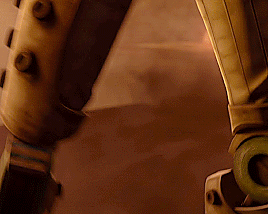
To be fair, yeah Echo’s treatment does prove that the Techno Union is not neutral like they claim. The modifications that everyone is gasping in horror at here obviously weren’t made with comfort and accessibility in mind, nor with Echo’s consent. But you still just want to be sure that “They took away his freedom, his humanity, they tried to turn him into a machine” is about using him as a living computer, not the fact that he is missing limbs.
The Batch is also pretty insensitive toward him and his trauma imo, which is weird considering they've supposedly also faced discrimination for their mutations
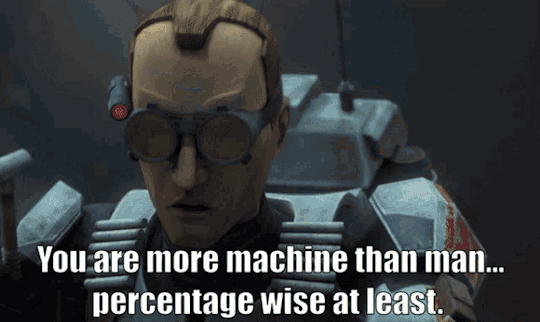
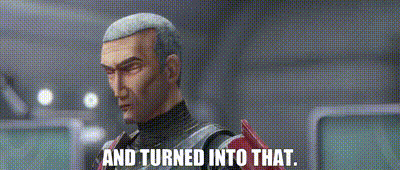
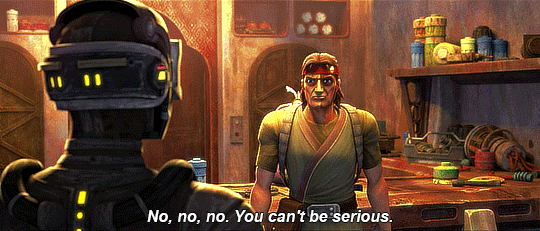
Disabled people do have to deal with stuff like this in this day and age so I guess it can speak to those experiences. I think especially him being mistaken as a droid (and Hunter going along with it (bruh)) might resonate with some people.
Aside from that stuff, Echo isn't really treated any differently as a character/person which is really good (as low of a bar as that is).
We get this moment in CW where Echo contemplates that yeah things are gonna be different now
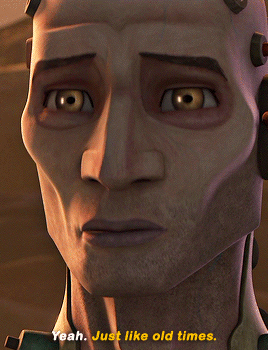
While also (imo at least) showing that he is still the same person regardless, evidenced by the fact that he just echoed Rex :,) I also think it's significant that he joins the Bad Batch on his own terms and we're given a really emotional scene to specifically show that he's not just like 'lumped in with the other misfits' but that it is his choice to go where he feels his place is.
A lot of people, myself included, are disappointed that TBB didn't have more time to explore Echo's PTSD, but I think the one panic attack scene we did get is really good. Even thought it's minor it at least is an appropriate reaction from a guy who was medically tortured (which is more than I've come to expect from Star Wars shows lol)
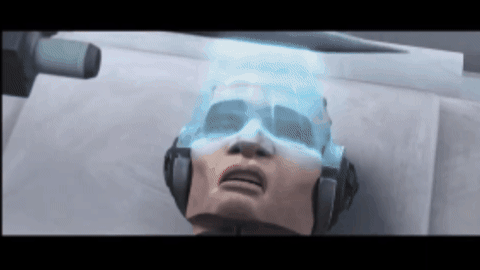
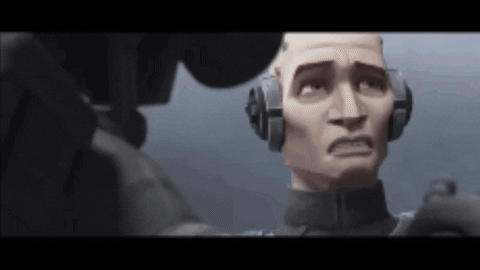
And it's really sweet to see Omega showing Echo some empathy and consideration.
It would have been nice to see more of his adjustment period, and other side effects like chronic pain and maintenance, but there’s a lot of daily life stuff the show never had time for (i.e. we don’t know if he removed his prosthetics to sleep, but we also never saw him sleep anyway). His disabilities might take on a background role (much like the character himself sadly) but for the most part they aren’t invisible or erased, nor do they define his character and arc.
Physical Appearance

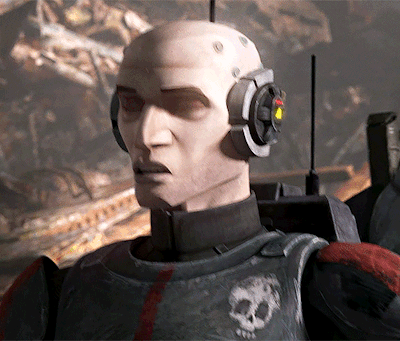
Okay this one is bit dicey, bc on the one hand, yes complaints that Echo’s paleness (most likely caused by burns from the explosion or chemical burns from the cryo-chamber) is whitewashing are totally valid. But I also think you can draw comparisons to real life conditions that affect pigmentation/complexion (like you know burns). So while I understand why a lot of fanart will depict him with his original skin tone and with hair, consider that there are real people who have to live with temporary or permanent changes to their appearance, and the idea of “fixing" him by making him look more like his old self can be problematic.
It's also interesting to note that Echo could act as a reversal of the 'disabled/disfigured = evil' trope. He's pale and bald and wears black and red, which is so often visually associated with villains, but we all know Echo is the bestest boy™
The Headpiece
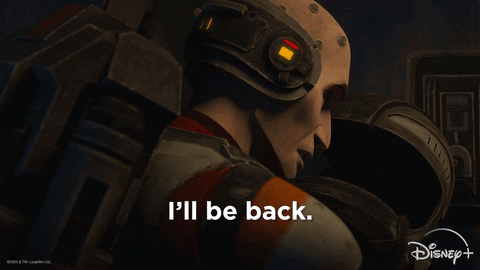
Echo’s headpiece is interesting because within the show we don’t actually ever learn much about it (idk if there is more info in books or whatever bc i don’t have them so?). He didn’t have it in CW so we know it didn’t come from the Techno Union and therefore Echo probably had more choice with it. We don’t know its exact purpose but it’s most likely related to his scomping abilities. When he is hacking with his scomp in CW, before he has his headpiece, it’s clearly very mentally straining:
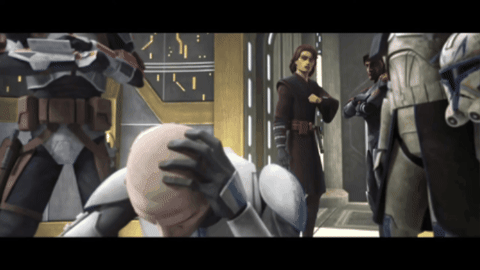
We don’t see him struggling like this in TBB once he does have it (though that could be bc he got more used to it over time). There doesn't seem to be much of an impact when he removes his headpiece in s3 ep14-15, except that he gets stuck in the ports every time he uses his scomp which is not something we’ve seen before:
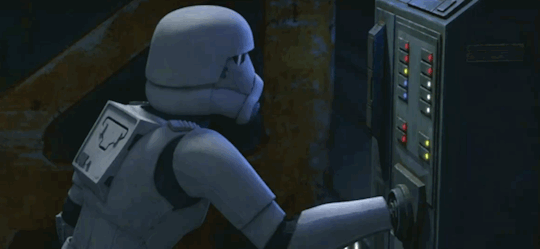
There might not be an exact real-world equivalent, but the headpiece is some kind of accessibility aid. It means that someone specifically designed a device to help him adapt to the changes the Techno Union made, as well as a helmet that integrates it. It’s removable and visually very present, much like a cochlear implant would be. (A lot of people actually headcanon it to act partially as a hearing aid, since it makes sense that Echo’s hearing would have been damaged in the explosion, but there isn't really any indication of this in canon.) The headpiece is never really acknowledged in the show, but I think that's a good thing. It's something he needs/wants and it just exists, completely normalized, and that's pretty cool 👍
Legs
Sigh... So from the very first episode of TBB I was really disappointed that the animation team or whoever completely visually erased Echo’s prosthetic legs (I think we all were, honestly, if fanart is anything to go by). It’s one thing when he’s in armor because he would probably want to protect his prosthetics, but we literally see him in his blacks and there is no indication whatsoever that he lost his legs even though it was not left up for debate at all in CW:
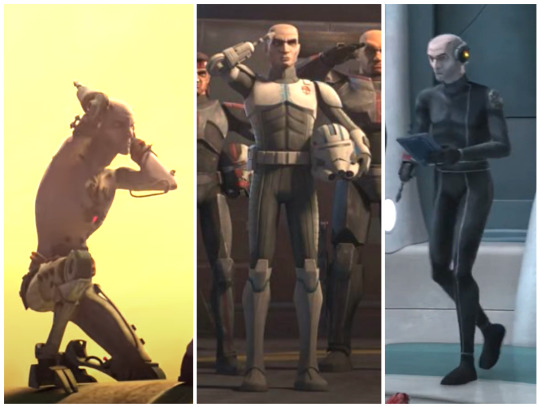
Like ??????!?
This is just really strange to me! Idk what went on behind the scenes with this decision but I don’t really see why it would be that much harder to animate or anything since it’s 3D and they've done it before. We do see some pretty sophisticated cybernetic technology in Star Wars canon that mimics real limbs:
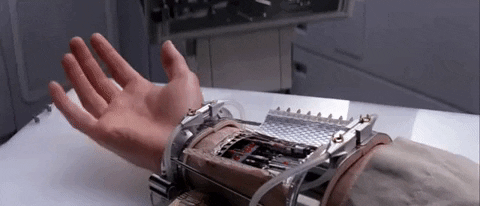
But Luke’s fancy hand is technically 20ish years from now, so Anakin and Maul are more of a representation of what level we could expect here
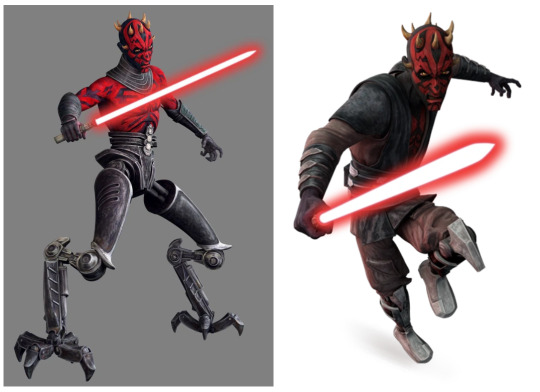
So yeah, for no apparent reason, his leg amputation is effectively, visually and narratively nonexistent. Which is not great 👎
Arm!
The scomp on the other hand (uh lol!) is the complete opposite and I kinda love it!
At first I, like many others, thought it was a bit odd that they didn’t give Echo a prosthetic arm. Losing hands is basically a Star Wars tradition at this point, so robotic arms/hands are well established within the worldbuilding:
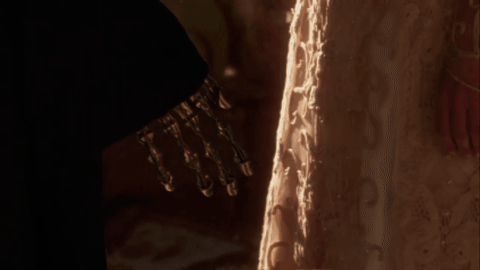
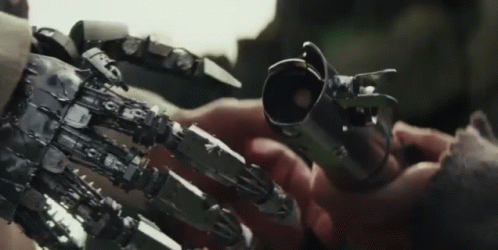
We aren’t necessarily given a canon reason for why Echo doesn't get a cybernetic arm (again unless it's in some lore book I haven’t read, sorry). General fanon explanations I’ve seen are that he either couldn’t because the Techno Union wired the scomp too far into his nervous system, and/or the resources to give him one were deemed too expensive for a clone (what about his legs tho?), or that he chose not to, usually because he thought the scomping was useful.
Regardless, I actually really love this choice (and it's the whole reason I made this post), because here's the thing: There’s a lot of problematic tropes out there that either erase/cure disabilities or compensate them with perks (like how pretty much any blind character is actually not blind by some sort of magic power). With amputees that is done with robotic arms. The character is still an amputee or course, and there is still value in that representation, if this story from Mark Hamill that makes me tear up is anything to go by:
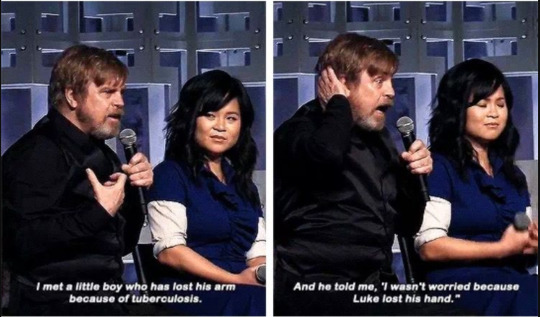
but for the most part these characters function like anyone else, just with a limb that looks a little different. It’s no more than a video game skin, an able-bodied actor with a green screen glove. It “cures” the disability, or it actually makes the character even stronger than usual:
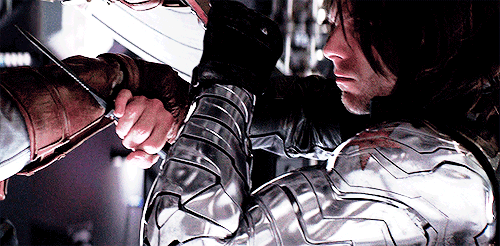
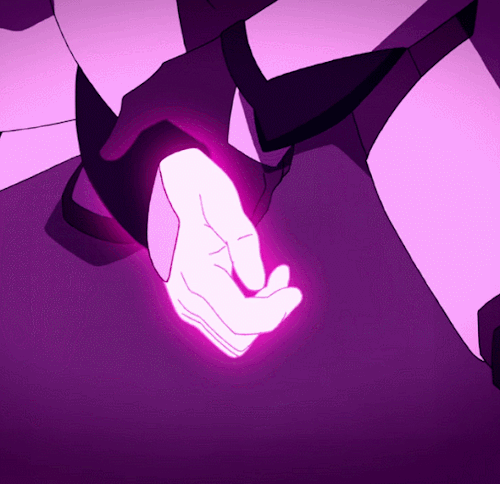
It usually makes sense within the world of the story, but the reason it’s not so great in my opinion is that in the real world we just do not have technology anywhere close to that yet. Prosthetics can more or less replace any mobility from lost legs, but not for all the complexities of a hand (and even if they could the average person wouldn’t be able to afford it).
So
I think it's actually really super cool that Echo’s scomp bypasses the canonically-established amputee erasure and functions much like a stump would irl. He integrates it into his movements and everyday life and it’s (as far as I know) a lot closer to an everyday amputee’s experience.

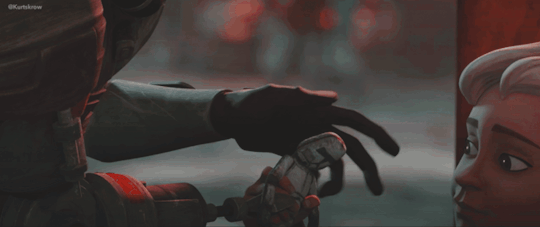
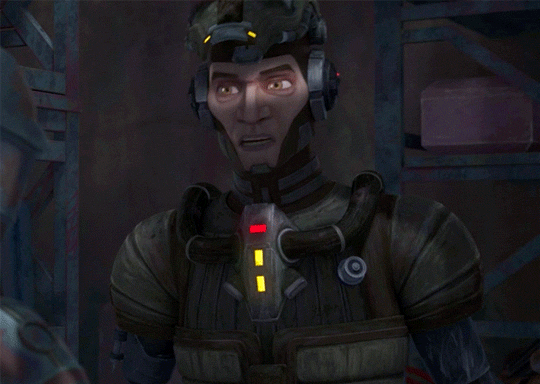


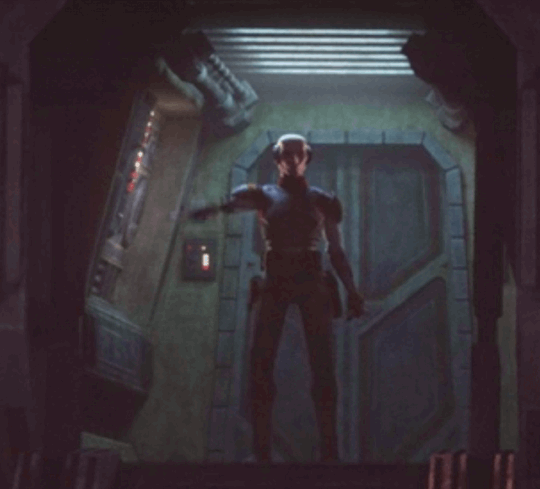
It doesn’t define his character, it doesn’t hold him back, he lives a full life, the other’s don’t treat him any differently, and he’s still a total karking badass
The only additional thing is that he sometimes uses it as a weapon (which given his story, I think it’s cool to see him taking back autonomy in a way, and we only see that like twice)

And also the scomping, which could be seen as the 'added/compensating superpower' trope. But narratively it's no different than if he was plugging in with a hacking gadget of some kind (he didn't necessarily "need" to lose his arm for it) and it’s not like Echo is completely defined by this skill. Personally, I think it's well worth the positives of him actually having a visible and realistically impactful amputation.
I see a lot of posts or comments out there that say stuff like “how come Echo doesn’t get a hand?” or fanworks that do give him one and I just think it’s a bit of a shame. If he did get a robotic hand, it just would have disappeared the same way his legs and Anakin’s arm did (aside from that one time he got yoinked by a magnet). When Echo did “get a hand” in the last two episodes there were comments like “yay he finally got a hand! but it doesn’t even work” but I was actually so relieved that it didn’t! Bc for one thing that wouldn’t make any sense, he grabbed it off a droid, it wasn’t designed to implement with his scomp, that would be really complicated. But more importantly because it again refused to erase/cure his disability! It functioned like a real-world cosmetic prosthetic (useless beyond appearance) which is exactly what he needed it for, so that he could blend in better with his disguise.
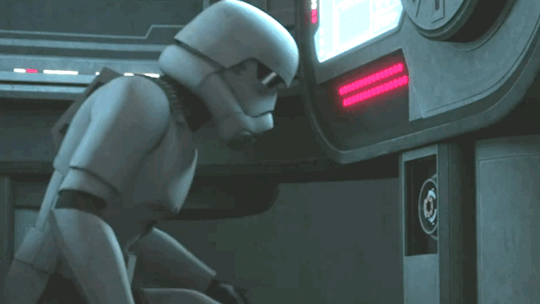
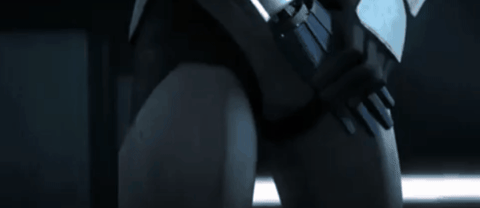
And he continually took it off throughout the episode and ditched it at the end. He only used it for the necessity of a stealth mission, he doesn’t feel the need to visually “fit in” in his daily life.
And, last but very much not least, he made a dad joke and from my intel that is very accurate representation!
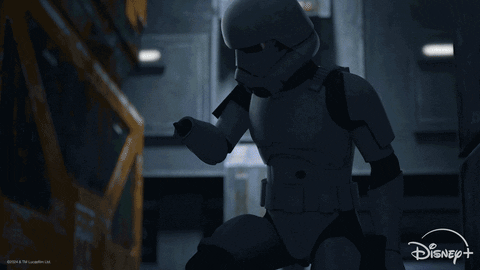
TLDR: Echo’s scomp is actually really cool from an amputee representation perspective, especially within Star Wars, and I think that deserves some appreciation
#man i just love him so much!#this post ended up ten times longer than i was expecting lol#its so strange to me that the same team that completely noped his prosthetic legs also gave us such good arm amputee represention#like whats up with that?#echo's scomp appreciation#also so glad those weird mod arm attachment things from the action figures never happened#representation matters#disabled lives are worth living#disability representation#amputee#disability tropes#robotic limbs#ableism#star wars#clone wars#the bad batch#sw tcw#arc trooper echo#tbb echo#tbb season 3#unwhitewashtbb#long post#accidental essay#analysis#thoughts#imo#rant#character analysis#writing disabled characters#writing
325 notes
·
View notes
Text
I noticed that the Mouthwashing fandom and sometimes even the game (though that may be due to it being from J*mmy’s perspective) tends to be very dehumanizing towards Curly post-crash. He is often treated like a burden or straight up corpse. But the only truly corpse-like thing about him is the fact that he has no skin (because that is literally impossible to survive). For a bit, I thought his limbs were missing entirely, or at least above the elbows and knees. Even then, I wrote out a whole thing on ways he could use (slightly more advanced) IRL devices that people with his disabilities use now.
I thought it could be more interesting to explore Post-Canon Curly using assistive technology without it being super sci-fi levels of advanced or going into certain disability tropes. I had a whole list of ideas for types of devices he could use besides prosthetics (or at least arm/hand prosthetics), and I might honestly still put it out there. It just was to show that Curly would still be capable of a lot of things, and though he would need help from others in certain areas and would need physical training, he could do a lot. I think the only thing that was ever truly holding him back was the pain of not having skin.
The most frustrating part of this is that even while still in the Tulpar with no technology for communication, there are ways he could communicate. One that I thought of is morse code. He may not have lips, but he has a functional jaw. He could open his mouth to represent dots and dashes, or even use other body parts to do morse code. Though it might be slow, it could work, especially if sped up a bit. And a bit of patience could go a long way. IDK, it would just be neat to see content where he and Anya find ways to communicate (even if a little slowly) and we see him interact with others post crash.
Especially seeing him talk to Anya and them keeping each other company etc. Not even in a shipping way, just in a "Curly didn't help Anya when she needed it most but she will still help Curly when he needs it most, and Curly realizes he was wrong but Anya chooses to forgive him" kind of way. It would also be neat to see him interact with the others like Swansea and Daisuke and J*MMY (derogatory), especially if it takes a little bit of Anya and Curly to develop a form of communication, so the others have the attitude they have in canon. But then Anya reveals Curly can talk now (albeit slowly), and each ends up visiting him at some point (Daisuke talking to him could be so much fun honestly).
It could have a pretty interesting effect on Curly's psychology and maybe even role in the story, as he wouldn’t be completely helpless like he appears to be in canon.
He is able to say things to others, like maybe provide certain information (important captain knowledge). He could convince Anya not to die (might not work, but could be interesting if he at least tries). He can have some interesting angst, like still trying to keep up a confident front and be the strong, reliable captain despite everything. However, he is also aware that he is in a difficult position right now and worries the others see him as weak and helpless or a burden of some kind (as they lowkey treat him in canon). He could tell J*mmy to fuck off. The possibilities are endless.
I just think there could be a lot of potential there and would feel less infantilizing/dehumanizing.
#mouthwashing#mouthwashing game#game mouthwashing#mouthwashing curly#disability representation#disability tropes#post crash curly#canon disabled character#assistive devices#mouthwashing fandom#ableism#fandom ableism#mouthwashing anya#physical disability#non verbal communication#the possibilities are endless#well okay not completely endless but you get my point
65 notes
·
View notes
Text
So I have a question for the disabled pokémon community in regards to designing a character, from an able bodied presenting person. I'm gonna give my sketch of Wally so far below under the cut if that helps.
I'm designing my take on older Wally, and I wanted to make him more visably disabled. I'm aiming for something aligned with cripple punk ideals beyond aesthetics, but I'm not that well read about it and I don't want to betray those values. Since his condition is only loosely implied to be asthma, which from my own limited observations is mostly seen through the use of medical inhalers, I thought I'd take a few creative liberties. I'm giving him a futuristic mask attached to a small cylindrical filter on his back through two large tubes on the side. It's not a permanent fixture, and he can take it off to sleep, eat, talk over tea, etc. It's sort meant to look like a knight mask, reminiscent of gallade. The mask functions as both a filter (since he works in/near the battle factory at the Hoenn battle frontier) and also as a drug administration device when he's having asthma-esque episodes. My idea is meant to invoke images of more villainistic / ableist characters (like the obvious Darth Vader), but once you meet him, Wally's is actually a very soft, sweet guy. He's just is also capable of annihilating you in a pokémon battle, so people talk up how scary he is to battle. I know this in itself is a trope, but I'm unaware of how the disabled community feels about it and if it's initself abeist. The rest of his clothing isn't villainous, just kind of a progress of what he wore when he was younger.
So, is there anything I should do differently or should know before going forward? I'm not going to pretend that I'm immune to being abeist, and I'm not sure if implying that Wally has some form of fictional pokémon asthma is really the proper way to go. But I thought I should at least try to reach out to the disabled community before I do anything that might be speaking for them.

#able bodied#disability advice#disability advocacy#cripple punk#wally pokemon#disabilties#disability#Pokémon#pokemon#fanart#character design#Hoenn#Sketch#my art#disability tropes#pokemon fanart#Wally#Pokemon Gen 3#pokemon ruby and sapphire
15 notes
·
View notes
Text
the rant 😳
great job pissing off someone who doesn't even have strabismus
CW: Swearing, Discussion of Ableism, Brief mention of Sanism, Implied Killing (fictional), Mention of Bullying, Brief mention of Body Horror (skin peeling)
the concept of turning "where's waldo" into a horror game but goddamn did the dev have to use fucking strabismus to make the antagonist look "creepy" or "uncanny" or "wrong" when real people look like that?
seriously, if you don't mind being spoiled, and knives don’t bother you, just google it and look at the pictures. that is literally hypotropia.
I'm not hating on the people/person behind the game. I'm saying that they should be past giving their antagonists legit disabilites to make them "scary-looking" in a 2023 GAME.
there are other ways of making a character look creepy and uncanny besides giving them strabismus.
real people are bullied for being strabismic. using it to make a KILLER look "creepy" or "unhinged" is fucking bullshit and NOT the representation those people with the condition need.
-----
I hate seeing character designers use strabismus to make a character look "creepy" or "wrong" or "uncanny".
Just look at the bridge worms. The skinned peeling face is horrifying, the strabismus was not needed.
-----
also the villains wiki's bullshit "p$ych0pathic killer" omg that's so accurate and original!!! /s
-----
#let's find larry#rant#ableism#sanism#disability tropes#character design#strabismus#trevor henderson mention#do not harrass the people mentioned#do not harass the dev of lfl#im just tired of this trope#spoilers
3 notes
·
View notes
Text
best trope is the one where the character’s godlike power is also killing them btw. they don’t even lift a hand to kill the monster but now they’re delirious with fever. they save a friend’s life and said friend immediately finds them emergency medical care. they raze the enemy to nothing and it takes far too long to find their pulse with all the bruising. their friends just constantly having to patch them up and worrying over which feat will be their last. et cetera
31K notes
·
View notes
Text
One thing I rarely see in injury and chronic pain fics is the grief that comes with missing out on stuff you love because you can no longer do them without hurting yourself. Writers who have been disabled their whole lives (or at least a long time) tend to forget that not all disabled people are used to being disabled. For able-bodied characters, especially athletic ones like vigilantes, a serious injury could mean a jarring change that includes giving up the things that mean the most to them.
I was physically fine until I was 18. Back then, my sense of self was entwined with interests that required a lot of movement and dexterity. I started doing MMA in middle school for self-defense. I loved parkour and even had a few hundred subscribers on my old YouTube channel. I learned to shoot and was gifted my first gun when I was 16. I took up multiple instruments. You get the idea.
My motorcycle accident fucked up the joints on my left side—my knee and shoulder especially, but also wrist to an extent. When it first happened, I thought I'd be on crutches for a bit but things would eventually get back to normal. The pain didn't go away even after I got rid of the crutches but I figured it was just residual and I should do what I'd been doing before. It's why I turned to substances—to block the pain and do what I love, but that's another topic. I didn't recognize my injury as a disabling thing until the end of the pandemic, when I put my parkour channel on an indefinite hiatus because it was seriously wearing my body down. It might sound silly to you but I was devastated. It's like if Spider-Man wasn't allowed to swing from buildings. It took me a long time to make peace with losing that part of me.
Another piece of that grief is even when you can do stuff, it's not the same because you have to exclude certain aspects of it for your own health. It's like the Robin that died and came back wrong. I can't use certain gym equipment and I have to tell my sparring partners what to avoid. I don't go to the shooting range much now because I can't extend my arm and hold a rifle for the amount of time it takes to aim without it starting to hurt. I'm a drummer, but I need breaks throughout the setlist and I can't do anything too fast or complex with the pedals, which means I can't play some of my favorite songs and my band is limited in what we write and perform. I can't take my motorcycle on road trips without frequent rest stops. Making accommodations helps physically, but emotionally, they're not always easy to accept because that means accepting the pain as a long-term disability rather than a temporary setback.
This got super long because I think it's unexplored in fics so some tips for creators:
First, learn how the body works and how stupidly fast and easy it is to get hurt. Mine was on a residential road because I didn't pay attention for 0.2 seconds
Learn the difference between internalized ableism and being upset over becoming disabled. I think a lot of writers skip over the feelings someone would naturally experience because it can be construed as ableism. Let them be in denial, sad, angry, etc. upon finding out because acceptance almost never happens right away. That's different from being a dick to themselves or others based on disability
Also, not everyone uses the same labels or has the same vocabulary to describe themselves. Different characters will have different ways of describing depending on their personality, level of knowledge, where they come from, and their relationship with their disability. I still don't really call myself disabled since I don't have it as bad as others so I tell people what happened instead (anyone who says "differently abled" will receive a different ability from me in the Denny's parking lot)
Think about how they cope with their new disability. Do they realize it's a disability right away? Do they talk to someone? Search desperately for a cure? Numb the pain? Turn to alternative methods? Do they worry about something else first, like money? Do they develop something else because of it, like a mental illness? Again, coping poorly is not ableism
What stays the same and what changes? I think about the difference between Forrest Gump and Lieutenant Dan after they were both wounded in battle
If they have a passion they can no longer pursue, it doesn't make much sense for them drop it so readily. Maybe they find a way to continue with accommodations (a good place to get creative!). Maybe they try and push through anyway. If they do ultimately resign, include the thought process and internal conflict behind it
#writers on tumblr#writeblr#writing#writing advice#writing tips#creative writing#fanfic tropes#fanfic#fanfiction#comic fandom#multi fandom#fandom#injury#chronic pain#disability#disabilties#disabled#dc comics#marvel#personal#writing resources#writing reference#grief#opinion#tw swearing#long post
781 notes
·
View notes
Text
Futuristic Settings and the Erasure of Disabilities
The common theme in a lot of futuristic, sci-fi or not, settings, is the abundance of cure tropes that are thrown in there. Disabled people either don't exist, or aren't actually disabled - they get a magical device that undoes their injury, or get a mech suit that basically does the same thing.
Often the setting is treated like an excuse that can't be rebutted in any way: “but my story is set in the future where medicine is better!”
So: is that true? Does better medicine actually mean less disabled people?
Historical Accuracy
[large text: Historical Accuracy]
In 1900, the life expectancy of a person born with Down syndrome was 9 years. Try putting yourself there and imagining that 2024 is the Future - better medicine, basically sci-fi in comparison to what they had back there. In that future, what is true?
a) There's no people with Down syndrome.
b) People with Down syndrome live to be 60 years old on average.
Answer: B. The only countries with fewer people with Down syndromes are the ones engaging in widespread eugenics, which is a topic I will not be getting into in this post, but I'm mentioning because the only places without disabled people are eugenicist.
The “better medicine” of the future didn't make Down syndrome curable, it made people with it survive longer. 50% of people born with it today will live to be over 60 years old. In the future, there will be retirees with Down syndrome. In the past, 50% of them wouldn't have made it into their teens.
Why does that matter?
[large text: Why does that matter?]
Future medicine won't make disabilities disappear. It will make them more manageable. Less deadly. Easier to survive.
If you base your knowledge and perception of disability throughout the times on sci-fi novels by able-bodied writers, you're going to hate how it actually works in real life.
Have we magically- technologically gotten rid of diabetes? No, 11% of Americans have it. 103 years ago, diabetes were lethal. There aren't fewer diabetics compared to the past. They live longer. You probably know or heard of someone who has diabetes.
You need to expand your understanding on how disability and medicine work, because “future = no disability” is genuine nonsense. It doesn't work like that, and it really frustrates me how writers dead-set on “logic” in their setting fail to see this.
Are paralyzed people walking around in various mechs, or are they using better wheelchairs than those from 100 years ago? Wheelchairs that make it easier to be independent? That help with symptoms of their disabilities by preventing pressure sores, or providing alternative methods of maneuvering?
In the future, why would there suddenly be those futuristic transplant* spines instead of wheelchairs that can be used with one's brain or eyes, for those who can't move their hands, mouth, or head? Why wouldn't there be wheelbeds for those who are currently bed-bound because they can't manage being upright in any way?
*Also, how are all of these magic disability-fixing transplants never actual transplants? Receiving a transplant basically always ends up in being immunocompromised because of the very way the body works. If you're writing about humans, this isn't going to change.
Things like sign language or wheelchairs have been used for thousands of years, they're not going away anytime soon or not-so-soon.
Future = More Disabled People?
[large text: Future = More Disabled People?]
We already discussed that there are presently common disabilities that used to be lethal a century ago or even less. If we use this fact for a futuristic setting, you suddenly have a myriad of new possibilities.
There's vastly better medicine? A lot of people deal with post-rabies syndrome because it's finally survivable, but it leaves people with the effects of the meningitis that rabies cause. There's way more quadriplegic people because the survival rates are much higher. Cancer survivors are more common because people live longer. Physical therapy for people who had prion diseases because they aren't fatal anymore but cause severe disability. Head trauma is more treatable, so there's more people with TBIs and fewer people dying in vehicular accidents.
The technology is super advanced? People with locked-in syndrome can operate an AAC device with their eyes, fully customize its voice to their liking, and not have to worry about battery life of their powerchair because it has sonar panels. Canes that can fold themselves with the click of a button so that they can fit in one's pocket.
There could be so many more adapted sports. Tools and technology that can adapt a house exactly to one's needs. Wheelchairs that are actually affordable. A portable pocket sized device that makes ableds behave normally around disabled people.
The point of this post isn't to completely shit on sci-fi settings, but instead to urge abled writers to think a bit more and try to be creative in the way they go about speculative fiction. Write. Something. New. There's one billion stories about how impossible it is for disabled people to exist in the future, and it's upsetting at best to read that constantly when you're disabled. As long as there are people, there will be disabled people.
mod Sasza
869 notes
·
View notes
Text
Why does every story that has a character with Down’s syndrome reduce them to “oh this character has Down’s syndrome, isn’t that sad?” Fuck that! Can I have a gay romcom where someone with Down’s syndrome falls in love with their co-worker? How about a slice of life webcomic where a girl with Down’s syndrome and her buddies start a band? Or a supernatural story about a vampire hunter with Down’s syndrome. I don’t know there’s so much potential you could do but you just make it a sad thing!
#candy talks#disability pride#down syndrome#tropes#positivity#disability pride month#facial difference#booklr#book recommendations#book idea#story inspo
804 notes
·
View notes
Text
The Perfect Prosthetic: Video Version
youtube
The perfect prosthetic is a super common trope surrounding amputees and people with limb differences who use a prosthetic limb, so let's talk about it!
This is a kind of extended version of the written post from yesterday with mostly the same stuff, plus additional examples, "red flags" that this trope is showing up in your work to watch out for and some additional detail that got cut from the written version.
#Writing Disability With Cy Cyborg#disability representation#writing disability#authors#writeblr#writing#Video#video essay#amputee#prosthetic user#writing advice#on writing#writer#creative writing#writerscommunity#The Perfect Prosthetic Trope#disability tropes#tropes#youtube#disabled#Youtube
372 notes
·
View notes
Text


give the people what they really want
#anime and manga#dtppf#disabled tyrant's beloved pet fish#character tropes#chinese#this is a joke I love Yang from Piofiore
613 notes
·
View notes
Text
I've remarked in the past that first-wave literary cyberpunk's skepticism of body modification is typically rooted in concerns about capitalist intrusion upon bodily autonomy and ownership of human bodies, with the "prosthetics eat your soul" stuff developing later in order to allow authors to continue to write about angsty cyborgs without any political subtext which might be uncomfortable for mainstream audiences.
(Which is not to say that "prosthetics eat your soul" is, itself, apolitical, of course – it merely exchanges a potentially uncomfortable political subtext for one which able-bodied audiences found more palatable!)
While this is true as far as it goes, I think it's also important to recognise that, while first-wave literary cyberpunk did have all that bodily autonomy stuff, it was almost invariably being written by able-bodied authors who treated it as a metaphor for the artist's loss of intellectual freedom under the corporate state, rather than as a topic worth exploring in its own right. Like, give credit where credit is due, but don't give those guys too much credit; they largely weren't taking disability rights issues seriously, either.
I'm saying this because I've noticed an increasing tendency in certain circles to characterise modern self-styled "cripplepunk" incarnations of the cyberpunk genre as in some sense reactionary – i.e., like they're merely rolling back the clock to before cyberpunk sold out. The fact of the matter is that the golden age of disability-aware cyberpunk literature never existed, and folks who are taking a hard look at that aren't trying to "turn back the clock": they're giving the literal text of this shit the attention it deserves for possibly the first time.
3K notes
·
View notes
Text
Me watching a Wicked bootleg and remembering the bit where they use Nessa's character to speedrun through every offensive trope and stereotype about disabled people:
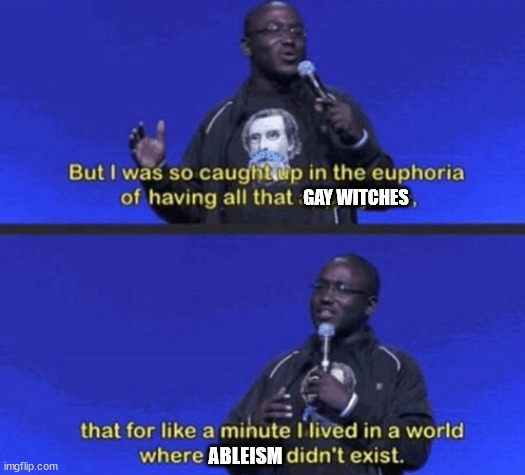
#wicked#nessa rose is like.#the shows writers looked up a list of 'offensive tropes related to disability'#and were like 'that sounds like a great idea for a character'#I keep seeing people praise the Wicked movie and also that they've been changing up nessa's character....#is her plotline done less poorly in the movie?#Im hoping they make massive changes to the second act#but the first act is still a bit funky as well#ive noticed theres not a lot of discussion about movie Nessa#and im wondering whether they make any efforts to undo some of the wildly Oof stuff from the musical
345 notes
·
View notes
Text
"Oooh, it's bad for vampires to take from blood banks. Because that's stealing from sick people who need it!"
The vampire will die if they don't get blood. I'd say that's a damn good example of "needing" it. Think about it for 3 fucking seconds. If there existed a group of people that need to consume human blood to survive in real life, do you know what that would be classified as? A fucking chronic illness, a DISABILITY.
Honestly that whole concept, of "risking your life by attacking strangers just to not starve is more ethical than using a public healthcare resource, actually", could actually work pretty well as in metaphor for the demonization of disabled people's right to not constantly struggle and take the "hard way". People want disabled people to struggle, to not take the 'easy way" like mobility aids or pain medication, to not listen to their bodies and rest when they need, to just be constant inspiration porn for ableds.
Can you imagine being a vampire, sobbing on the floor of a hospital as your fangs puncture the plastic skin of an IV bag, berating yourself for "stealing resources" just to survive, knowing that the people who would call you a monster for this would rather you risk getting beaten to death by risking a bite from a person. There's no one in your life who can consent to your teeth. No one you can count on for help.
God, doesn't that just feel poignant?
419 notes
·
View notes
Text
BROOOOOOOOOOOOO THE IDEA OF DAMAGING YOUR WHUMPEE'S LEGS ENOUGH THAT THEY CANT RUN OR WALK SUPER LONG DISTANCES IS SO GOOD!!!!!!!! BC WHUMPER CAN JUST LEAVE THE DOOR OPEN AND WHUMPEE KNOWS BETTER THAN TO TRY TO RUN, their legs can't carry them far enough to reach safety, the only thing they would get out of "running away" is the punishment that follows!
I also just love the idea of a whumpee not being able to stand for long periods of time either! And most of the time when whumpee does walk somewhere, it's either with the help of whumper, or they keep tripping and falling and running out of energy while traveling.
(juicy for recovery after the whump too!)
387 notes
·
View notes